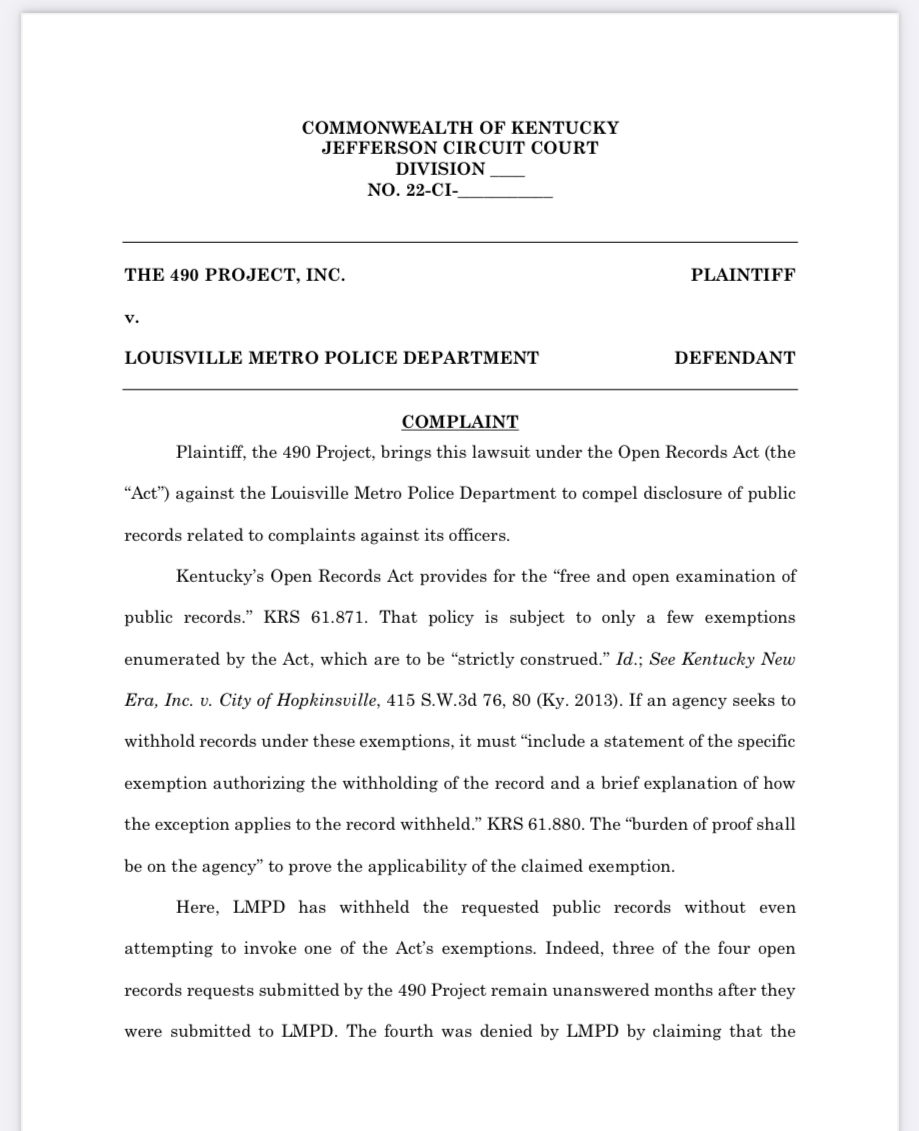
Mirroring controversies at the national level, premature destruction of public records is now an issue squarely before a Kentucky court and all Kentuckians.
The 490 Project and its attorneys, Michael Abate and Rick Adams, as well as WFPL News and The Courier Journal, have focused attention on an illegal practice that is yet another public agency subterfuge to avoid accountability.
https://wfpl.org/police-accountability-group-suing-lmpd-over-access-to-…
https://www.courier-journal.com/story/news/local/2022/10/06/louisville-…
https://wfpl.org/wp-content/uploads/2022/10/490-Project-Complaint-final…
The issue surfaced at the national level earlier this year in extensive reporting on illegal records destruction associated with the January 6 insurrection.
https://www.washingtonpost.com/nation/2022/07/19/secret-service-texts/
https://kyopengov.org/blog/dry-dust-records-management-issues-news-and-…
https://kyopengov.org/blog/national-archives-inquiry-about-improper-des…
In separate articles published on October 6, The Courier and WFPL examined a recent lawsuit filed by the 490 Project, “a grassroots group focused on police accountability.”
The group alleges that the Louisville Metro Police Department’s refusal to comply with its statutory duty to take final action on open records requests within five business days — by disclosing nonexempt public records or identifying the legal basis for nondisclosure — violates the open records law.
But in a first of its kind claim, the group alleges that LMPD has subverted the intent of the open records law through the premature and illegal destruction of public records — in this case, complaints leveled against police officer that LMPD designates “informal” — in contravention of state law governing the minimum retention of those records.
Records retention “schedules” are established under state law and promulgated into state regulation. They establish the minimum period a public record must be kept. Anything less constitutes improper records destruction and, potentially, tampering with a public record — a Class D felony.
https://apps.legislature.ky.gov/law/statutes/statute.aspx?id=52400
https://apps.legislature.ky.gov/law/kar/titles/725/001/061/
https://apps.legislature.ky.gov/law/statutes/statute.aspx?id=19864
This critical public records issue has largely evaded public notice but has long been employed as a means of evading public accountability.
So much so, in fact, that in 1994 Kentucky lawmakers expressly recognized “an essential relationship between the intent of this chapter [dealing with open records] and that of KRS 171.410 to 171.740, dealing with the management of public records” and that “to ensure the efficient administration of government and to provide accountability of government activities, public agencies are required to manage and maintain their records according to the requirements of these statutes.”
https://apps.legislature.ky.gov/law/statutes/statute.aspx?id=50009
Simply stated, without effective public records management there can be no public records access.
The current dispute centers on LMPD’s practice of “contracting away” its records retention duties to the FOP by negotiating a 90 day retention for “informal”complaints in lieu of the two year state requirement. This contract term was ostensibly eliminated — under public pressure — in its most recent collective bargaining session but continues to reverberate and to impede the public’s right to know.
https://www.courier-journal.com/story/news/crime/2021/12/07/louisville-…
The lawsuit also seeks to eliminate the judicially repudiated distinction between retention periods for formal and informal complaints established in the retention schedule and promulgated into state regulation.
https://casetext.com/case/kentucky-st-bd-of-med-v-courier-journal
If 46+ years of open records law is any indicator, it is these complaints that are most jealously guarded by law enforcement agencies — because they so often “cause inconvenience or embarrassment to public officials or other” — but are most essential to the public’s right to know whether “public servants are indeed serving the public.”
https://apps.legislature.ky.gov/law/statutes/statute.aspx?id=23058
https://law.justia.com/cases/kentucky/supreme-court/1992/90-sc-498-dg-1…
As one who — as an assistant attorney general — witnessed many cases in which public access was obstructed by improper records destruction, and who — as the attorney general’s proxy on the Libraries, Archives, and Records Commission and a member of the Archives and Records Advisory Committee — vigorously argued against the formal/informal treatment of complaints and for longer retention of all complaints against public employees — I am gratified that the 490 Project, and it’s attorneys, are at last focusing attention on an open government issue that should concern all Kentuckians.
Louisville Metro Police Department is walking on very thin legal ice. The law is clear.



